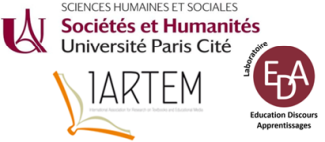Theoretical framework
Within international educational media research, the potentials of Open Educational Resources for diverse learning groups are being explored. Due to their accessibility and adaptivity, OER are being associated with inclusion (UNESCO 2012 Paris OER Declaration). Given that inclusion is dependent on national, historical, social and political contexts and can be looked at from different angles (e.g. the social justice lense differentiating inclusion as access, participation and empowerment, Gidley & Hampson 2010) the postulate of inclusion-sensitivity will encounter divergent understandings.
This complexity coming along with reflections on inclusion is multiplied in the context of digital educational media: digital technologies pose new possibilities for inclusion-sensitivity as well as challenges in terms of barriers to participation and exclusion. Numerous stakeholders are involved in discourses about inclusion in educational media – e.g. the OER community.
Particularly the postulated intersection between OER, digitalization and inclusion-sensitivity raise the question of how well-founded the affiliation between OER and inclusion really is or can be. Merely postulating openness in educational media and OER as conducive to participation and inclusion could even obscure social inequalities (Otto & Kerres 2022). Given these tensions, it is important to clarify how inclusion is commonly understood in the context of OER. Of particular influence regarding a common understanding are OER providers. They are defined as stakeholders who publish and distribute OER on digital repositories, therefore serving as an access point to assessing understandings of inclusion in the OER movement.
Based on these thoughts this paper poses the following question: What are the understandings of inclusion of OER providers?
Methodology
The research question is being approached qualitatively. In order to be able to adequately approach the intersection of inclusion and OER, the focus was on interview partners whose repositories distribute openly available school learning materials. Preference was given to platforms that made the connection to open education and OER explicit. The body of data consists of 4 guideline-based interviews with OER providers from Germany, Czech Republic, Sweden & Luxembourg focusing on the perceived potentials of OER, inclusion and digitality. [MP1] Data was gathered in the context of the digiLLM project focusing on digital inclusion-sensitive teaching and learning materials. This initial exploratory approach to the research question aims to elicit the perspectives of stakeholders involved in publishing and distributing OER. For the analysis, the abductive thematic analysis according to Thompson (2022) was used. The inductive analysis captures how the respondents involved with OER think about inclusion. This perspective was complemented by an analysis with deductive categories, which were generated from the theory surrounding OER and scientific literature on the connection between open education, open educational resources and inclusion. Taking into account both the perspectives extracted from the data material as well as assumptions and understandings about inclusion in the context of OER allowed to conceptually explain the findings and identify gaps between potentials and practice.
The comparison of the data sets envisaged in the abductive thematic analysis was undertaken as an international comparison (Waterkamp 2006) in order to evaluate on how OER communities deal with inclusion issues at a transnational level. This was done in order to do justice to the different national perspectives on the issue of OER.
Preliminary results & Outlook
Preliminary results show that providers particularly refer to the adaptivity of digital material in connection with inclusion. This relates to the level of inclusion as both access in the sense of redistributive justice and participation in the sense of recognitive justice. Other levels of inclusion in the context of OER, such as the content level, the initial design of the materials and aspects of empowerment or participation (as is the case, for example, in the context of open educational practices), could not be extracted from the data. Nevertheless, they are listed as equally important in the academic discussion about the inclusivity of OER.
Against the background of a social justice perspective on inclusion, a mismatch can be identified between theoretically postulated potentials and those perceived in practice. If digital educational media is recognized as having inherent inclusive potential despite these limitations, this may be due to technological determinism (the assumption of initiating inclusion through technical solutions).
As an outlook, the question is raised as to whether technological determinism might hinder the inclusivity of educational media – and how this can be counteracted.

 PDF version
PDF version
